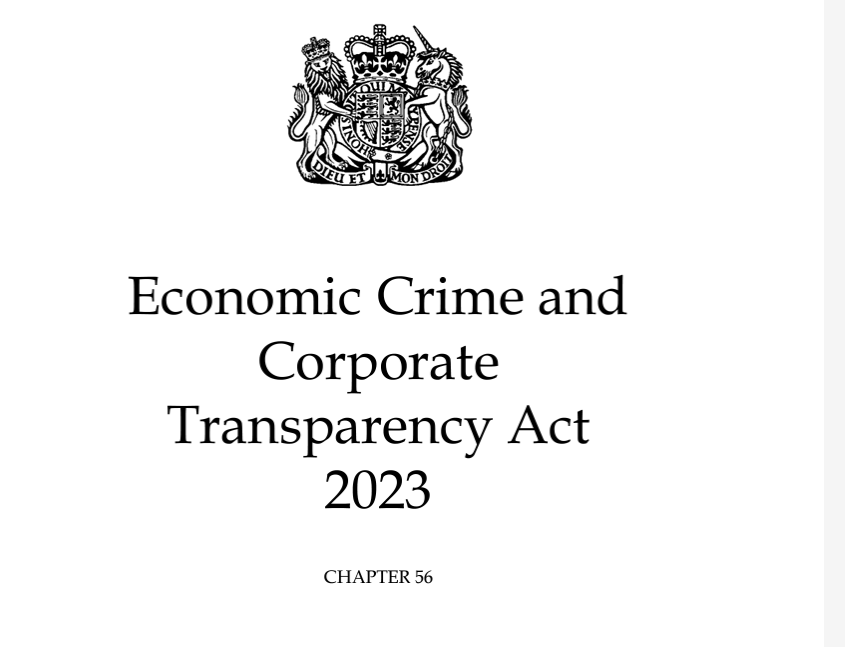
by John McCarthy Consulting Ltd. | Dec 2, 2023 | Blog, News
The term ‘MLRO’ is not mentioned in the legislation but at this stage has become well-established in practice. In this short series of blogs, we explore the role and responsibilities of the MLRO in an accountancy firm.
The MLRO is responsible for the following anti- money laundering (ML) tasks is an accounting firm:
- Implementing and enforcing an appropriate risk-based approach;
- Ensuring that the systems and controls in place are appropriate to manage the risks faced by the firm; and
- Ensuring that the firm complies with the legislation and CCABI Guidance.
The MLRO must also:
- Possess the knowledge, skills and understanding of the firm’s ML risks;
- Complete, and periodically update, the Firm-Wide Risk Assessment (also known as the Business Wide Risk Assessment) under section 30A of the Criminal Justice (Money Laundering and Terrorist Financing) Acts 2010 to 2021 which outlines and provides an assessment of these risks;
- Receive internal STRs (Suspicious Transaction Reports) from employees and Senior Management in the firm;
- Make the ultimate decisions on behalf of the firm on whether these suspicions need to be reported externally to the Garda And Revenue;
- Report to Garda And Revenue by completing and submitting an external STR on the GoAML system and subsequently with Revenue on ROS.
IT Controls Assessment
Auditors are reminded that there are relatively significant changes in the requirements of ISA 315 Identifying and Assessing the Risks of Material Misstatement for accounting periods commencing 15 December 2021, which in practical terms means, accounting periods Ended 21 December 2022 and later.
Auditors dealing with the audits of entities with such accounting periods affected by these change will need, to adopt new audit programmes and, in additional to the normal audit tests, to also assess the entity’s IT controls (no matter what the size of that entity).
This is a significant new development for auditors of SMEs, in particular, and will be a game changer ion the type of audit documentation and evidence of assessment of such IT controls by the auditor on audit files.
For an easy to implement additional (two page) IT Controls Questionnaire to help document the above process, please click on this link to download immediately for only €60 + VAT.
Please also go to our website to see our:
- Anti-Money Laundering Policies Controls & Procedures Manual (March 2022) – View the Table of Contents click here.
- AML webinar (March 2022) available here, which accompanies the AML Manual. It explains the current legal AML reporting position for accountancy firms and includes a quiz. Upon completion, you receive a CPD Certificate of attendance in your inbox.
- letters of engagement and similar templates. Please visit our site here where immediate downloads are available in Word format. A bulk discount is available for orders of five or more items if bought together.
- ISQM TOOLKIT or if you prefer to chat through the different audit risks and potential appropriate responses presented by this new standard, please contact John McCarthy FCA by e-mail at john@jmcc.ie.
We typically tailor ISQM training and brainstorming sessions to suit your firm’s unique requirements. The ISQM TOOLKIT 2022 is available to purchase here.

by John McCarthy Consulting Ltd. | Nov 28, 2023 | Blog, News
A controversial proposal to update the UK FRC Revised Ethical Standard from the Financial Reporting Council in the UK states that they are proposing to enhance the prohibition (among other proposals) on certain tax services that can be provided to the majority shareholders of unlisted entities. The proposal is for this service to be banned in the UK from 15 December 2024. Please note that this is a UK proposal only and is not necessarily going to be adopted as currently worded. It does not apply to audits for Republic for Ireland entity audits.
The proposal wording is as follows (quoting from the consultation document):
Tax Services
5.67 The range of activities encompassed by the term ‘tax services’ is wide. They include where the firm:
(a) provides advice to the entity on one or more specific matters at the request of the entity; or
(b) undertakes a substantial proportion of the tax planning or compliance work for the entity; or
(c) promotes tax structures or products to the entity, the effectiveness of which is likely to be influenced by the manner in which they are accounted for in the financial statements, or in audit subject matter information;
(d) performs any of the services described in paragraphs a-c to individuals who are the majority owner(s) of an unlisted entity relevant to an engagement.
This latter service is proposed to be banned from 15/12/2024 in the UK.’ The consultation is now closed as the deadline was 31 October 2023.
The reason we bring this to the attention of our readers in Ireland is that quite often the Irish Audit & Accounting Supervisory Authority (the audit regulator in Ireland) has, in the past, incorporated similar changes to the Code of Ethics for Auditors in Ireland, sometimes with amendments, but not always.
The normal process would be for the Irish Audit & Accounting Supervisory Authority to consult in Ireland on any changes to its Code of Ethics and, taking account of feedback received, may then publish a new Ethical Standard for auditors, which would most likely not be effective before 15 December 2024. At the time of writing we have no notice of such intent on the part of the Irish Audit & Accounting Supervisory Authority.
IT Controls Assessment
Auditors are reminded that there are relatively significant changes in the requirements of ISA 315 Identifying and Assessing the Risks of Material Misstatement for accounting periods commencing 15 December 2021, which in practical terms means, accounting periods Ended 21 December 2022 and later.
Auditors dealing with the audits of entities with such accounting periods affected by these change will need, to adopt new audit programmes and, in additional to the normal audit tests, to also assess the entity’s IT controls (no matter what the size of that entity).
This is a significant new development for auditors of SMEs, in particular, and will be a game changer ion the type of audit documentation and evidence of assessment of such IT controls by the auditor on audit files.
For an easy to implement additional (two page) IT Controls Questionnaire to help document the above process, please click on this link to download immediately for only €60 + VAT.
Please also go to our website to see our:
- Anti-Money Laundering Policies Controls & Procedures Manual (March 2022) – View the Table of Contents click here.
- AML webinar (March 2022) available here, which accompanies the AML Manual. It explains the current legal AML reporting position for accountancy firms and includes a quiz. Upon completion, you receive a CPD Certificate of attendance in your inbox.
- letters of engagement and similar templates. Please visit our site here where immediate downloads are available in Word format. A bulk discount is available for orders of five or more items if bought together.
- ISQM TOOLKIT or if you prefer to chat through the different audit risks and potential appropriate responses presented by this new standard, please contact John McCarthy FCA by e-mail at john@jmcc.ie.
We typically tailor ISQM training and brainstorming sessions to suit your firm’s unique requirements. The ISQM TOOLKIT 2022 is available to purchase here.

by John McCarthy Consulting Ltd. | Nov 1, 2023 | Blog, News
The intention of this blog is to comment on some of the differences between the Industrial & Provident Societies Acts 1893 to 2021 versus the Companies Act, 2014:
Entity size thresholds – the Industrial & Provident Societies Acts 1893 to 2021 contain no concept for ‘micro’, ‘small’, ‘medium’ or ‘large’ entities, as these are all concepts enshrined in Irish company law by the Companies Act, 2014.
As a result Industrial & Provident societies (mostly these are cooperative ventures between community based groups) cannot:
- Be audit exempt;
- Avail of exemption from consolidation on the grounds of being a ‘small’ group;
- Cannot file abridged accounts; and
- Cannot use Section 1A of FRS 102 there is no concept of ‘small’ in their specific legislation;
- Must always include a Statement of Cash Flows under FRS 102/IFRS.
Statement on Relevant Audit Information – this is a statement required under section 330 of the Companies Act, 2014 where the directors of the company confirm that they have taken all relevant steps to inform the auditors of any relevant audit information and have established that the company’s statutory auditors are aware of that information. There is no equivalent requirement in the Industrial & Provident Societies Acts 1893 to 2021.
Compliance Statement – the Directors’ Compliance Statement (section 225 Companies Act, 2014) is required by certain entities incorporated under the Companies Act, 2014 but here is no equivalent in the Industrial & Provident Societies Acts 1893 to 2021.
There was a Government consultation to modernise the laws about Co-operative Societies which ended in February 2022 followed by a bill published in November 2022 but the bill hasn’t progressed as yet. See the Chartered Accountants Ireland website for the latest information available.
IT Controls Assessment
Auditors are reminded that there are relatively significant changes in the requirements of ISA 315 Identifying and Assessing the Risks of Material Misstatement for accounting periods commencing 15 December 2021, which in practical terms means, accounting periods Ended 31 December 2022 and later.
Auditors dealing with the audits of entities with such accounting periods affected by these change will need, to adopt new audit programmes and, in additional to the normal audit tests, to also assess the entity’s IT controls (no matter what the size of that entity).
This is a significant new development for auditors of SMEs, in particular, and will be a game changer ion the type of audit documentation and evidence of assessment of such IT controls by the auditor on audit files.
For an easy to implement additional (two page) IT Controls Questionnaire to help document the above process, please click on this link to download immediately for only €60 + VAT.
Please also go to our website to see our:
- Anti-Money Laundering Policies Controls & Procedures Manual (March 2022) – View the Table of Contents click here.
- AML webinar (March 2022) available here, which accompanies the AML Manual. It explains the current legal AML reporting position for accountancy firms and includes a quiz. Upon completion, you receive a CPD Certificate of attendance in your inbox.
- letters of engagement and similar templates. Please visit our site here where immediate downloads are available in Word format. A bulk discount is available for orders of five or more items if bought together.
- ISQM TOOLKIT or if you prefer to chat through the different audit risks and potential appropriate responses presented by this new standard, please contact John McCarthy FCA by e-mail at john@jmcc.ie.
We typically tailor ISQM training and brainstorming sessions to suit your firm’s unique requirements. The ISQM TOOLKIT 2022 is available to purchase here.

by John McCarthy Consulting Ltd. | Nov 1, 2023 | Blog, News
The UK Economic Crime and Corporate Transparency Act, 2023 become law on 26 October 2023 (all 389 pages of it!). The Act is not expected to become effective until early 2024. It makes the following changes:
- ID with be required (for the first time) for all new/existing company directors, people with significant control (PSC) or beneficial owners as we in them in the RoI), and those who file on behalf of companies;
- There are new rules for registered office addresses which means companies can no longer use a PO Box as their registered office address;
- a new requirement for companies to supply a registered email address;
- a requirement for companies to confirm they’re forming the company for a lawful purpose when they incorporate/confirm on annual renewal in subsequent years.
IT Controls Assessment
Auditors are reminded that there are relatively significant changes in the requirements of ISA 315 Identifying and Assessing the Risks of Material Misstatement for accounting periods commencing 15 December 2021, which in practical terms means, accounting periods Ended 31 December 2022 and later.
Auditors dealing with the audits of entities with such accounting periods affected by these change will need, to adopt new audit programmes and, in additional to the normal audit tests, to also assess the entity’s IT controls (no matter what the size of that entity).
This is a significant new development for auditors of SMEs, in particular, and will be a game changer ion the type of audit documentation and evidence of assessment of such IT controls by the auditor on audit files.
For an easy to implement additional (two page) IT Controls Questionnaire to help document the above process, please click on this link to download immediately for only €60 + VAT.
Please also go to our website to see our:
- Anti-Money Laundering Policies Controls & Procedures Manual (March 2022) – View the Table of Contents click here.
- AML webinar (March 2022) available here, which accompanies the AML Manual. It explains the current legal AML reporting position for accountancy firms and includes a quiz. Upon completion, you receive a CPD Certificate of attendance in your inbox.
- letters of engagement and similar templates. Please visit our site here where immediate downloads are available in Word format. A bulk discount is available for orders of five or more items if bought together.
- ISQM TOOLKIT or if you prefer to chat through the different audit risks and potential appropriate responses presented by this new standard, please contact John McCarthy FCA by e-mail at john@jmcc.ie.
We typically tailor ISQM training and brainstorming sessions to suit your firm’s unique requirements. The ISQM TOOLKIT 2022 is available to purchase here.

by John McCarthy Consulting Ltd. | Oct 17, 2023 | Blog, News
The IAASA Ethical Standard for Auditors (Ireland) 2020 (the Standard) became effective on 15 July 2021. This blog addresses the main requirements of the Standard in so far as it applies to auditors of non-listed private entities.
It is the purpose of this blog to address issues affecting non-listed/private entities. Please refer to the Irish Audit & Accounting Supervisory Authority Ethical Standard 2020 if your interest is in Public Interest/Listed Entities and firms that are part of international networks.
Fee Dependence
Section 4 of the Standard sets percentage limits on the proportion of total fee income that can be earned from an audited entity. These limits are often referred to as ‘fee dependence’. The limits may be exceeded in certain circumstances, without triggering negative consequences. It’s of great importance to keep a record of when these limits are exceeded, for which clients and to maintain a log of the corrective action taken, when the limits are exceeded.
Where it is expected that the total fees for services receivable from a non-listed entity that is not a public interest entity and its subsidiaries relevant to a recurring engagement by the firm will regularly exceed 15% of the annual fee income of the firm or, where profits are not shared on a firm-wide basis, of the part of the firm by reference to which the engagement partner’s profit share is calculated, the firm shall not act as the provider of the engagement for that entity and shall either resign or not stand for reappointment, as appropriate.
Time to resign or expand
Where the total annual fees for audit and non-audit services regularly (defined below) exceed 15% of the firm’s annual fee income, the firm must not accept/continue the audit appointment. Obviously advance planning is required when this situation is on the horizon e.g. expand the firm through merger, so as to dilute the fee dependency position below the 15% threshold or plan to resign. (IAASA Ethical Standard paragraph 4.36).
Between 10% and 15%
Whether or not the limits can be exceeded, depends on certain specific circumstances. Detailed guidance can be found in paragraphs 4.36 to 4.46 of the standard. We pay special attention to the word ‘regularly.’
For non-listed private entities the fee dependence limit is 10%. Where fees for the entity and its subsidiaries regularly exceed 10% of the firm’s annual fee income, but fall below 15%, the firm may determine it is possible to continue to act subject to:
- disclosure to the firm’s Ethics Partner/Function;
- disclosure to those charged with governance of the audit entity; and
- completion of an external independent quality control review prior to the finalisation of the audit report (IAASA Ethical Standard paragraph 4.43).
The table below summarises the fee dependency levels discussed above.
| Type of client |
Normally
acceptable |
Further action required |
Unacceptable if regular |
| Non listed/private entities |
Not more than 10% |
More than 10% but not exceeding 15% |
Exceeding 15% |
Definitions:
Definitions in the area of ethics and audit are often of critical importance to reaching the correct answer. Here is a list of the main definitions that apply:
Firm’s Annual Fee Income – this is the annual fee income as billed by the firm for the provision of services but excludes income where the firm acts as agent for another party (e.g. if the firm is a subcontractor).
Sole practitioners – The limits may be more difficult for a sole practitioner to apply, but the Standard helpfully includes a footnote to paragraph 4.34 confirming that as a sole practitioner, annual fee income includes all earned income received by the individual. This is because the firm (the sole practice) and the individual are effectively one and the same. Monies received from pensions can also be considered as ‘earned income’ as they arise from past earnings.
Engagement partners – Where the profit share for the engagement partner is derived from only part of the firm, the reference to firm should be taken to mean that part of the firm only.
What Does Regularly Mean? – Although there is no definition in the Standard of the term ‘regularly’ a sensible approach is set out in a 2021 information sheet from the ICAEW (unfortunately available to members only) that states that where income from an audited entity has exceeded the limits for three consecutive years, it has become a ‘regular’ event. In such circumstances it would be difficult to argue that it would be acceptable to continue to act.
Special Circumstances – There are some limited circumstances in which the fee limits may be exceeded such as:
- Engagements assigned by legislation – The fee dependence limits do not apply to engagements of entities where the responsibility for the engagement is assigned by legislation and the firm cannot resign from the engagement, irrespective of considerations of economic dependence (e.g. for certain public sector bodies) (IAASA Ethical Standard paragraph 4.33).
- Unpredictable events – Where fee limits are exceeded as the result of an unpredicted individual event or engagement and an objective, reasonable and informed third party would consider ceasing to act as detrimental or against the public interest, the firm may be able to continue subject to disclosure and adequate safeguards (IAASA Ethical Standard paragraph 4.38).
- Starting a new practice – A new firm seeking to establish itself may find it difficult to comply with the fee limits. For a period not exceeding two years, a firm may exceed the 15% limit for non-listed audited entities which are not PIEs, subject to an external independent quality control review before the audit report is issued (IAASA Ethical Standard paragraph 4.44).
- Small entities – For small entities the firm may be able to claim the relief given in paragraph 6.5 of the IAASA Ethical Standard Provisions Available for Audits of Small Entities (PAASE) and dispense with the need for an external review provided the disclosure required by paragraph 6.5 is made. See paragraph 6.4 of the IAASA Ethical Standard for a definition of what constitutes a ‘small entity’.
IT Controls Assessment
Auditors are reminded that there are relatively significant changes in the requirements of ISA 315 Identifying and Assessing the Risks of Material Misstatement for accounting periods commencing 15 December 2021, which in practical terms means, accounting periods Ended 31 December 2022 and later.
Auditors dealing with the audits of entities with such accounting periods affected by these change will need, to adopt new audit programmes and, in additional to the normal audit tests, to also assess the entity’s IT controls (no matter what the size of that entity).
This is a significant new development for auditors of SMEs, in particular, and will be a game changer ion the type of audit documentation and evidence of assessment of such IT controls by the auditor on audit files.
For an easy to implement additional (two page) IT Controls Questionnaire to help document the above process, please click on this link to download immediately for only €60 + VAT.
Please also go to our website to see our:
- Anti-Money Laundering Policies Controls & Procedures Manual (March 2022) – View the Table of Contents click here.
- AML webinar (March 2022) available here, which accompanies the AML Manual. It explains the current legal AML reporting position for accountancy firms and includes a quiz. Upon completion, you receive a CPD Certificate of attendance in your inbox.
- letters of engagement and similar templates. Please visit our site here where immediate downloads are available in Word format. A bulk discount is available for orders of five or more items if bought together.
- ISQM TOOLKIT or if you prefer to chat through the different audit risks and potential appropriate responses presented by this new standard, please contact John McCarthy FCA by e-mail at john@jmcc.ie.
We typically tailor ISQM training and brainstorming sessions to suit your firm’s unique requirements. The ISQM TOOLKIT 2022 is available to purchase here.










